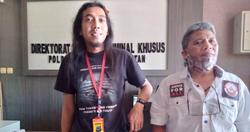Indonesia: Blogger held over land dispute report
Criminal defamation has chilling effect on media freedom
 On May 4, 2020, the South Kalimantan police arrested and detained blogger Diananta Putra Sumedi (left) in Banjarmasin, charging him with online defamation, which carries a maximum penalty of six years in prison. Photo: Alliance of Independent Journalists, 2020
On May 4, 2020, the South Kalimantan police arrested and detained blogger Diananta Putra Sumedi (left) in Banjarmasin, charging him with online defamation, which carries a maximum penalty of six years in prison. Photo: Alliance of Independent Journalists, 2020
The Indonesian police in South Kalimantan province should drop criminal defamation charges against a blogger for articles in which he interviewed indigenous Dayak leaders about a land dispute with an oil palm plantation, Human Rights Watch said today. The authorities should immediately release the blogger, Diananta Putra Sumedi, who has been detained since May 4, 2020.
Criminal penalties for alleged defamation are a disproportionate punishment, have a chilling effect on media freedom, and are frequently abused by the police. Those harmed by publications should seek redress through civil defamation.
“Threatening a writer with prison for criminal defamation has a chilling effect on freedom of speech for all journalists,” said Andreas Harsono, senior Indonesia researcher. “Civil defamation is a more proportionate response to alleged defamatory speech.”
Human Rights Watch in 2010 published an analysis of the negative impact of Indonesia’s criminal defamation laws including the internet law and urged their repeal. Those laws contain extremely vague language that has allowed retaliation against journalists and others who had made allegations of corruption, fraud, or misconduct against powerful interests or government officials.
In November 2019, Sumedi wrote on his blog, Banjar Hits, about PT Jhonlin Agro Raya, a palm oil company and subsidiary of the Tanah Bumbu-based Jhonlin Group. The company has had a dispute with Dayak villagers, including Sukirman, the head of a Dayak association. Sukirman is quoted saying he planned to file a lawsuit alleging that the company had illegally appropriated land in three Dayak villages.
Jhonlin Group contested the allegations, and, in accordance with Indonesian law, filed a complaint with Indonesia’s Press Council on November 11. The complaint was brought against Sumedi, his blog Banjar Hits, and Kumparan, a “media collaboration company” in Jakarta that sponsored and provided the platform.
Sukirman filed a report denying the quotes attributed to him. Banjar Hits and Kumparan published a letter from Sukirman denying the quotes. Jhonlin Group also filed a police report. Sumedi had not recorded the interview with Sukirman.
On February 5, the Press Council issued a statement that censured Sumedi for publishing unverified stories. It directed Kumparan to provide the Jhonlin Group the right to respond, saying that the stories were unethical and racially insensitive for creating tension between the Dayak and the Bugis, the ethnic group of the Jhonlin Group’s founder in South Kalimantan. In response to the Press Council recommendations, Kumparan on February 11 took down the stories from the internet, apologized to the Jhonlin Group, and later terminated its collaboration with Banjar Hits.
Three months later, on May 4, the South Kalimantan police arrested and detained Sumedi, charging him with online defamation, which allows pretrial detention and carries a maximum penalty of six years in prison.
A police spokesman said that his arrest and detention were necessary because Sumedi might continue to write stories about this case.
A 2017 memorandum of understanding between Indonesia’s National Police and the Press Council permits a petitioner to request the police to pursue a criminal defamation case if the petitioner is not satisfied with the outcome of a Press Council mediation. Most alleged defamation cases against journalists end at the Press Council, and do not become the basis for a criminal case.
It is not clear whether the Jhonlin Group was dissatisfied with the Press Council statement. Kumparan reported that Jhonlin Group did not use their right to respond. Human Rights Watch contacted the Jhonlin Group and its founder by email and phone, but received no response.
Indonesia’s Alliance of Independent Journalists have questioned Sumedi’s detention, asking the South Kalimantan police to drop the case because he had already been sanctioned.
In 2018, another Jhonlin Group company filed a defamation case against another reporter, Muhammad Yusuf, who was arrested and died five weeks later in South Kalimantan police custody.
Land disputes linked to oil palm plantations have been frequent. Konsorsium Pembaruan Agraria (Consortium for Agrarian Reform, KPA), an Indonesian organization, documented more than 650 land-related conflicts affecting over 650,000 households in 2017. Journalists and indigenous rights defenders covering land disputes have been arrested under various laws in addition to criminal defamation.
In December 2019, the immigration office detained an American editor, Phil Jacobson of the environmental news website Mongabay, in Palangka Raya, Central Kalimantan, after he attended a hearing between the local parliament and an indigenous rights advocacy group. The immigration office accused him of breaking Indonesia’s immigration law, by entering the country without a journalist visa. He was deported on January 31.
On April 26, Hermanus, a Dayak farmer, died in a Sampit hospital in Central Kalimantan, while he was facing theft charges related to his efforts to defend Dayak villagers’ land from a palm oil plantation.
“The Indonesian police and aggrieved companies should stop bringing criminal defamation charges to intimidate, detain, or prosecute journalists and others exercising their freedom of speech,” Harsono said. “By having alleged defamation cases go before the Press Council, Indonesia provides a means to quickly address and rectify inaccuracy in the media.”












